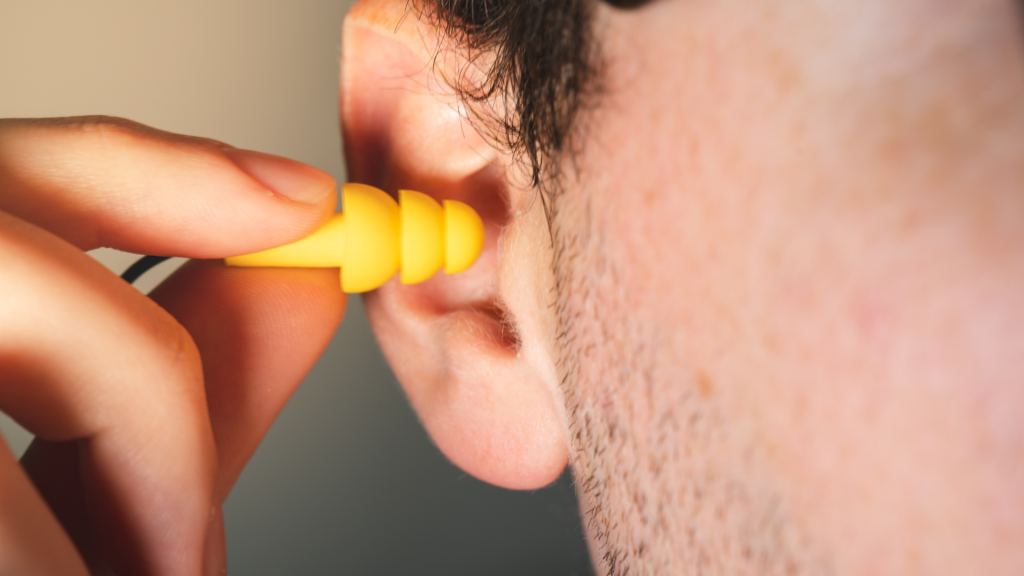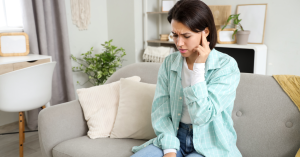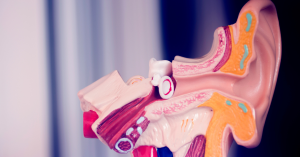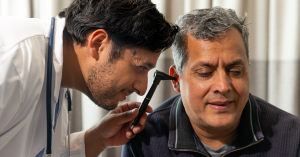You brush your teeth to prevent cavities. You stretch to protect your joints. But what are you doing daily to protect your hearing?
For most people, the answer is… not much.
Yet your hearing is one of your most valuable and vulnerable senses—and the truth is, much of what affects it has nothing to do with aging and everything to do with lifestyle choices. What you eat, how you move, the noise you tolerate, and the way you manage stress all shape the future of your ears.
The good news? Hearing loss isn’t always inevitable.
Many cases are preventable—or at least manageable—through consistent, healthy habits that preserve the delicate structures of your auditory system. Whether you’re already experiencing changes in your hearing or simply want to be proactive, the steps you take today can make a world of difference tomorrow.
In this comprehensive guide, we’ll walk you through the best natural strategies to preserve hearing, reduce your risk of damage, and promote better listening—no matter your age.
Because strong hearing doesn’t start at the audiologist’s office. It starts at home.
Why Lifestyle Matters for Long-Term Hearing Health
The Science Behind Hearing and Daily Habits
Your ears are more than just sound collectors—they’re intricate systems of nerves, tiny bones, fluid chambers, and sensory cells working in sync. These structures depend on blood flow, cellular integrity, and neurological health to function properly—all of which are shaped by your daily routines.
Here’s how it works:
- The cochlea, your hearing organ, needs a steady supply of oxygen-rich blood
- Tiny hair cells inside the cochlea convert sound waves into electrical signals—but once damaged, they don’t regenerate
- The auditory nerve relays signals to the brain, which relies on good neurovascular function and overall mental clarity
So if you’re skipping meals, not sleeping well, overexposing yourself to noise, or ignoring signs of stress, you may be diminishing your hearing’s resilience—without even realizing it.
Just like vision, muscle strength, or skin health, your hearing thrives with care—and declines without it.
Preventable vs. Inevitable Hearing Loss
It’s a common myth that hearing loss is an inevitable part of aging. While age-related hearing loss (presbycusis) is real, research shows that up to 50% of hearing loss is preventable.
The biggest culprits include:
- Noise-induced damage (from music, work environments, or loud tools)
- Poor circulation from lack of exercise or smoking
- Inflammation and oxidative stress driven by unhealthy diets or chronic stress
- Medications and lifestyle factors that increase ear vulnerability
This means that hearing decline isn’t just genetic or age-based—it’s often the result of decades of cumulative habits. The earlier you start protecting your ears, the more likely you are to retain sharp, vibrant hearing into your 70s, 80s, and beyond.
Key Lifestyle Habits That Support Hearing Preservation
Nutrition and Hydration for Ear and Nerve Health
What you eat directly fuels your ears—especially the cells and nerves responsible for processing sound. Certain nutrients play an essential role in reducing inflammation, improving circulation, and maintaining auditory function.
Nutrients That Protect Hearing
- Magnesium helps protect inner ear cells from noise damage
- Vitamin B12 and Folate support nerve health and blood flow
- Omega-3 fatty acids (found in fish and seeds) promote ear circulation
- Zinc strengthens immune function and helps ward off ear infections
- Antioxidants (like vitamins C, E, and A) fight oxidative stress
Hydration Matters
Your inner ear contains fluid-filled chambers essential for balance and hearing. Dehydration can interfere with this system, leading to dizziness, ear pressure, or muffled sounds.
To support your ears:
- Drink 6–8 glasses of water a day
- Limit excessive caffeine or alcohol, which can dehydrate and irritate ear tissues
- Eat water-rich foods like fruits, cucumbers, and leafy greens
Exercise, Circulation, and Auditory Function
You might not associate physical activity with better hearing—but they’re closely linked.
♀️ How Movement Supports Your Ears
- Exercise improves blood flow to the cochlea, delivering oxygen and nutrients
- It helps regulate blood pressure, a factor in age-related hearing loss
- Activity reduces inflammation and cortisol, both known to damage hearing cells
Aim for:
- 150 minutes of moderate cardio weekly (walking, biking, swimming)
- Resistance training 2–3 times per week
- Daily movement like stretching, yoga, or even dancing to music
Even short bursts of exercise improve circulation to the ears and help protect the tiny hair cells responsible for translating sound into brain signals.
Everyday Noises That Harm—And How to Avoid Them
Volume Control and Safe Listening Practices
Most people don’t think twice about cranking up their favorite playlist or taking a call with earbuds in. But exposure to sounds above 85 decibels (dB) can cause permanent hearing damage over time—especially when the exposure is repeated or prolonged.
Here’s how to stay safe:
Safe Listening Tips
- Follow the 60/60 rule: Listen at no more than 60% volume for no more than 60 minutes at a time
- Use noise-canceling headphones to reduce the need for high volume in loud environments
- Avoid using earbuds in noisy areas (they sit closer to the eardrum and are harder to control)
- Choose over-the-ear headphones when possible—they’re gentler on your ears
- Give your ears “recovery time” after loud exposure (like concerts or parties)
When in doubt, remember this: If you have to raise your voice to talk to someone, it’s too loud for your ears.
Environmental and Occupational Noise Exposure
It’s not just music that’s risky—many everyday sounds can take a toll on your hearing, especially when you’re around them often.
Common Culprits
- Lawnmowers, leaf blowers, and power tools
- Traffic, sirens, and construction work
- Nightclubs, sporting events, or fitness classes with amplified music
- Workplace machinery or industrial equipment
How to Protect Yourself
- Wear ear protection (like foam earplugs or custom-fit defenders) when using loud equipment
- Use apps to measure decibel levels in your surroundings
- Limit time spent in loud environments, and stand back from speakers or noise sources
- Talk to your employer about noise regulations and available protections if you work in a high-decibel setting
By taking small precautions, you can dramatically reduce your risk of noise-induced hearing loss (NIHL)—which is both common and completely preventable.
Wellness Practices That Reduce Hearing Strain
Stress Management and Tinnitus Prevention
Stress isn’t just a mental burden—it has very real effects on your hearing. Chronic stress increases cortisol, narrows blood vessels, and can trigger or worsen tinnitus (ringing in the ears) or auditory sensitivity.
How Stress Affects Hearing
- Reduces blood flow to the cochlea
- Exacerbates inflammation and fluid imbalances
- Disrupts auditory processing in the brain
- Intensifies tinnitus by increasing nervous system hyperactivity
♂️ Stress Reduction Practices for Hearing Health
- Mindfulness meditation and breathing exercises
- Yoga or tai chi to calm both body and auditory system
- Journaling or CBT to manage anxiety linked to noise sensitivity
- Regular screen breaks and digital detoxes to reduce sensory overload
Even 10–15 minutes of daily stress management can help your ears “relax” and function better.
Sleep, Ear Hygiene, and Hearing Recovery
Hearing is active—even while you sleep. But your ears need downtime just like your muscles and brain.
Sleep and Auditory Health
During deep sleep, your brain processes auditory input, restores neural function, and regulates stress. Poor sleep:
- Weakens auditory nerve performance
- Elevates cortisol (which damages ear cells over time)
- Worsens tinnitus and listening fatigue
To optimize sleep:
- Aim for 7–9 hours each night
- Use white noise to reduce tinnitus perception
- Avoid screens and loud sounds before bed
Safe Ear Hygiene Habits
Contrary to popular belief, cotton swabs can harm your ears. They push wax deeper, irritate the canal, and increase infection risk.
Healthier alternatives:
- Use a warm washcloth to clean the outer ear
- Use doctor-recommended ear drops for wax buildup
- Visit a professional for safe cleaning if needed
- Keep ears dry after swimming or showering
Small acts of ear care go a long way in preventing blockages, infections, and inflammation that interfere with hearing clarity.
How to Build a Hearing-Healthy Routine for Life
Regular Screenings, Early Detection, and Hearing Aids
You don’t have to wait for hearing problems to show up to get tested. Just like dental or vision checkups, hearing screenings are essential to long-term health.
Why Regular Hearing Tests Matter
- They track your baseline and detect early changes
- Help identify issues before they become permanent
- Provide insight into lifestyle adjustments you may need
- Enable early use of hearing aids or other tools, which improve outcomes significantly
Adults over 50 should be tested every 1–2 years, or sooner if you:
- Work in a noisy environment
- Have a history of frequent ear infections
- Notice difficulty hearing in conversations or noisy spaces
Don’t Fear Hearing Aids
Modern hearing aids are discreet, digital, and powerful. Early use can:
- Preserve speech comprehension
- Reduce cognitive load
- Prevent social withdrawal or frustration
- Improve brain health and listening confidence
Family History, Aging, and Long-Term Prevention Tips
Even with excellent habits, some hearing loss is genetic or age-related. That’s why combining healthy routines with early awareness is crucial.
Know Your Family History
If your parents or siblings had early hearing loss, your risk may be higher. Share this with your audiologist and begin screenings earlier than the average timeline.
How to Slow Age-Related Decline
- Avoid ototoxic medications when possible (consult your doctor)
- Use assistive tech in noisy environments (captioned phones, TV streamers)
- Stay mentally and socially active to keep auditory pathways sharp
- Pair hearing protection with regular movement and good sleep
By building a proactive hearing care routine now, you’ll enjoy sharper, more vibrant hearing later in life—and you’ll stay connected to the people, experiences, and moments that matter most.
Conclusion: Small Choices, Lifelong Sound
Your ears are powerful, precise, and irreplaceable. They help you connect with loved ones, enjoy music, navigate the world, and embrace everyday life. But they’re also vulnerable—and the way you treat them daily can determine how well they serve you decades from now.
Hearing loss doesn’t have to be a given. With the right lifestyle habits, many causes of auditory decline are not only manageable—they’re preventable. From mindful listening and balanced nutrition to stress relief, movement, and regular checkups, your daily choices create the blueprint for lifelong hearing wellness.
So, turn the volume down. Move your body. Feed your nerves. And give your ears the same care and protection you’d give to your heart or your eyes.
Because when you protect your hearing, you’re not just preserving a sense—you’re preserving connection, communication, and quality of life.
Frequently Asked Questions
Can lifestyle really affect hearing loss?
Absolutely. Factors like diet, exercise, noise exposure, sleep, and stress play a major role in ear health. Many cases of hearing loss—especially noise-induced and circulatory-related types—are preventable with the right daily habits.
What are the best foods for hearing health?
Foods rich in magnesium, zinc, vitamin B12, omega-3 fatty acids, and antioxidants help protect inner ear cells and support nerve function. Leafy greens, berries, nuts, fatty fish, and citrus fruits are excellent choices.
Is it okay to use earbuds every day?
Yes, but with caution. Follow the 60/60 rule: listen at no more than 60% volume for no more than 60 minutes at a time. Overuse or loud volumes can damage delicate hair cells in the inner ear.
Can stress or lack of sleep really affect hearing?
Yes. Chronic stress and poor sleep increase inflammation and cortisol levels, which can impair circulation to the ears, worsen tinnitus, and reduce your brain’s ability to process sound efficiently.
How often should I get my hearing checked?
Adults should have their hearing tested every 3–5 years, or annually if they are over 50, have a family history of hearing loss, or are regularly exposed to loud environments.
What are simple daily tips for protecting hearing?
- Lower headphone volume
- Take listening breaks
- Avoid inserting objects into the ears
- Stay hydrated
- Move regularly
- Get enough rest
- Use ear protection in loud environments






